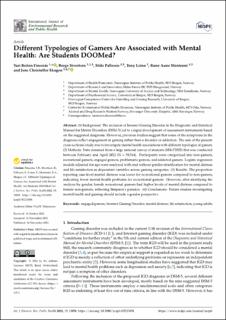| dc.contributor.author | Finserås, Turi Reiten | |
| dc.contributor.author | Sivertsen, Børge | |
| dc.contributor.author | Pallesen, Ståle | |
| dc.contributor.author | Leino, Tony Mathias | |
| dc.contributor.author | Mentzoni, Rune Aune | |
| dc.contributor.author | Skogen, Jens Christoffer | |
| dc.date.accessioned | 2022-12-12T12:33:52Z | |
| dc.date.available | 2022-12-12T12:33:52Z | |
| dc.date.created | 2022-11-29T15:36:07Z | |
| dc.date.issued | 2022 | |
| dc.identifier.issn | 1661-7827 | |
| dc.identifier.uri | https://hdl.handle.net/11250/3037269 | |
| dc.description.abstract | (1) Background: The inclusion of Internet Gaming Disorder in the Diagnostic and Statistical Manual for Mental Disorders (DSM-5) led to a rapid development of assessment instruments based on the suggested diagnosis. However, previous studies suggest that some of the symptoms in the diagnosis reflect engagement in gaming rather than a disorder or addiction. The aim of the present cross-sectional study was to investigate mental health associations with different typologies of gamers. (2) Methods: Data stemmed from a large national survey of students (SHoT2022) that was conducted between February and April 2022 (N = 59,544). Participants were categorized into non-gamers, recreational gamers, engaged gamers, problematic gamers, and addicted gamers. Logistic regression models adjusted for age were analyzed with and without gender-stratification for mental distress and life satisfaction as dependent variables across gaming categories. (3) Results: The proportion reporting case-level mental distress was lower for recreational gamers compared to non-gamers, indicating fewer mental health problems for recreational gamers. However, after stratifying the analysis by gender, female recreational gamers had higher levels of mental distress compared to female non-gamers, reflecting Simpson’s paradox. (4) Conclusions: Future studies investigating mental health and gaming should include a gender perspective. | en_US |
| dc.language.iso | eng | en_US |
| dc.publisher | MDPI | en_US |
| dc.rights | Navngivelse 4.0 Internasjonal | * |
| dc.rights.uri | http://creativecommons.org/licenses/by/4.0/deed.no | * |
| dc.title | Different Typologies of Gamers Are Associated with Mental Health: Are Students DOOMed? | en_US |
| dc.type | Journal article | en_US |
| dc.type | Peer reviewed | en_US |
| dc.description.version | publishedVersion | en_US |
| dc.rights.holder | Copyright 2022 The Author(s) | en_US |
| dc.source.articlenumber | 15058 | en_US |
| cristin.ispublished | true | |
| cristin.fulltext | original | |
| cristin.qualitycode | 1 | |
| dc.identifier.doi | 10.3390/ijerph192215058 | |
| dc.identifier.cristin | 2084430 | |
| dc.source.journal | International Journal of Environmental Research and Public Health (IJERPH) | en_US |
| dc.identifier.citation | International Journal of Environmental Research and Public Health (IJERPH). 2022, 19 (22), 15058. | en_US |
| dc.source.volume | 19 | en_US |
| dc.source.issue | 22 | en_US |

